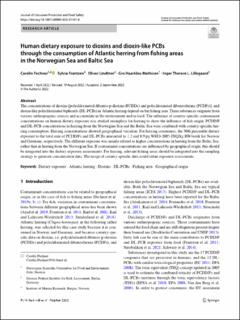Human dietary exposure to dioxins and dioxin-like PCBs through the consumption of Atlantic herring from fishing areas in the Norwegian Sea and Baltic Sea
Fechner, Carolin; Frantzen, Sylvia; Lindtner, Oliver; Mathisen, Gro Haarklou; Lillegaard, Inger Therese L.
Peer reviewed, Journal article
Published version
Permanent lenke
https://hdl.handle.net/11250/3029790Utgivelsesdato
2022Metadata
Vis full innførselSamlinger
- Articles [3001]
- Publikasjoner fra CRIStin [3025]
Originalversjon
Journal für Verbraucherschütz und Lebensmittelsicherheit. 2022, . 10.1007/s00003-022-01401-0Sammendrag
The concentrations of dioxins [polychlorinated dibenzo-p-dioxins (PCDDs) and polychlorinated dibenzofurans (PCDFs)], and dioxin-like polychlorinated biphenyls (DL-PCBs) in Atlantic herring depend on the fishing area. These substances originate from various anthropogenic sources and accumulate in the environment and in food. The influence of country-specific contaminant concentrations on human dietary exposure was studied exemplary for herring to show the influence of fish origin. PCDD/F and DL-PCB concentrations in herring from the Norwegian Sea and the Baltic Sea were combined with country-specific herring consumption. Herring concentrations showed geographical variation. For herring consumers, the 50th percentile dietary exposure to the total sum of PCDD/Fs and DL-PCBs amounted to 1.2 and 8.9 pg WHO-2005-TEQ/kg BW/week for Norway and Germany, respectively. The different exposure was mainly related to higher concentrations in herring from the Baltic Sea, rather than in herring from the Norwegian Sea. If contaminant concentrations are influenced by geographical origin, this should be integrated into the dietary exposure assessments. For herring, relevant fishing areas should be integrated into the sampling strategy to generate concentration data. The usage of country-specific data could refine exposure assessments.
